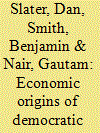| Srl | Item |
| 1 |
ID:
132974


|
|
|
|
|
| Publication |
2014.
|
| Summary/Abstract |
From Aristotle to Acemoglu and Robinson, scholars have argued that democracy possesses powerful redistributive impulses, and imperils itself accordingly. We challenge the validity of the redistributive model of democratic breakdown in the postcolonial world-the only cases where democracies have collapsed since World War II-because its assumptions regarding state power are questionable or even inapplicable in postcolonial settings. Our correlative analysis of cross-sectional time series data from 139 countries between 1972 and 2007 indicates that, contrary to the expectations of the redistributive model, redistributive taxation is negatively associated with the incidence of military coups and the likelihood of democratic breakdown. Furthermore, authoritarian takeovers do not appear systematically to result in reduced redistribution from the rich. More fine-grained historical evidence from Southeast Asia-a region where the redistributive model should be especially likely to hold true-further affirms that authoritarian seizures of power are neither inspired by successful redistributive policies nor followed by their reversal. Taken together, these quantitative and qualitative data offer significant support for our central theoretical claim: contemporary democratic breakdowns have political origins in weak states, not economic origins in class conflict.
|
|
|
|
|
|
|
|
|
|
|
|
|
|
|
|
| 2 |
ID:
068386


|
|
|
| 3 |
ID:
082209


|
|
|
|
|
| Publication |
2008.
|
| Summary/Abstract |
This article argues that, in contrast with prevalent choice-theoretic accounts of institutional origins in new democracies, the passage of Indonesia's regional autonomy laws in 1999 took place despite the interests of powerful political actors rather than because of them. Lacking the past experience to calculate retrospectively the likely electoral payoff from supporting an effort to devolve political power to Indonesia's city and regency governments, New Order-era political elites in Jakarta gambled on the advice of a team of experts. The experts assured them that supporting the effort would give them strong and salient reformist credentials on the eve of free elections. The conclusion of the article suggests that the political origins of regional autonomy in Indonesia have broad implications for the understanding of institutional genesis in new democracies, and that the potential impact of expert advisers is a fruitful focus of future research
|
|
|
|
|
|
|
|
|
|
|
|
|
|
|
|
| 4 |
ID:
180454


|
|
|
|
|
| Summary/Abstract |
In the last decade resource curse scholars have argued widely that oil-rich countries are more likely to initiate armed disputes with their neighbors. In this essay, we argue that the evidence points toward oil peace, not conflict, as a function of both domestic and international factors. We draw on analyses of our own dataset and two from past studies to show that the data is more supportive of petro-peace than of petro-aggression. We also demonstrate that the Iran–Iraq War is singularly responsible for what was believed to have been a radical-petro-aggression effect globally. We conclude that, to the extent that evidence suggests a trend, it is more likely for a Pax Petrolica.
|
|
|
|
|
|
|
|
|
|
|
|
|
|
|
|
| 5 |
ID:
119695


|
|
|
|
|
| Publication |
2013.
|
| Summary/Abstract |
Recent research on separatist nationalism has focused on the most common location of new states in the international system-the postcommunist world. While providing the largest number of cases for exploration, the arguably unique features of the Soviet system may have effects that do not easily translate to other parts of the world. This article reviews a recent set of books that highlights this question, focusing on the legacies of Soviet ethnofederalism in catalyzing secession, separatist war, and nation-state crisis. These books share in common a tendency to deemphasize the historical lineages of separatist nationalism and to focus more proximately on institutions. The article builds on the discussion of recent research by engaging two separate cross-national data sets to explore the role of ethnofederal institutions and of historical legacies. It concludes by arguing for a return to historically situated studies of center-minority conflicts and for greater engagement across regional lines of expertise.
|
|
|
|
|
|
|
|
|
|
|
|
|
|
|
|
| 6 |
ID:
181548


|
|
|
|
|
| Summary/Abstract |
Cross-national statistical research based on “all country” data sets involves no deliberate selection and hence ignores the potential for endogenous selection bias. We show that these designs are prone to selection bias if existing units are subject to differential survival rates induced, in part, by treatment. Using rudimentary graph theory, we present survivorship bias as a form of collider bias, which is related to but distinct from selection on the dependent variable. Because collider bias is always relative to a specific causal model, we present a causal model of post-colonial sovereignty on the Arabian Peninsula, show that it implies survivorship bias in the form of false positives with respect to the political resource curse, and provide historical evidence confirming that the model correctly depicts the creation of sovereign countries on the Arabian Peninsula but not elsewhere. When we correct for endogenous selection bias, the effect of oil on autocratic survival is shown to be negligible. The study motivates the need to think more broadly about the nature of the data-generating process when making causal inferences with observational data and to construct statistical models that are sensitive to treatment heterogeneity and rooted in context-specific knowledge and qualitative inferences.
|
|
|
|
|
|
|
|
|
|
|
|
|
|
|
|